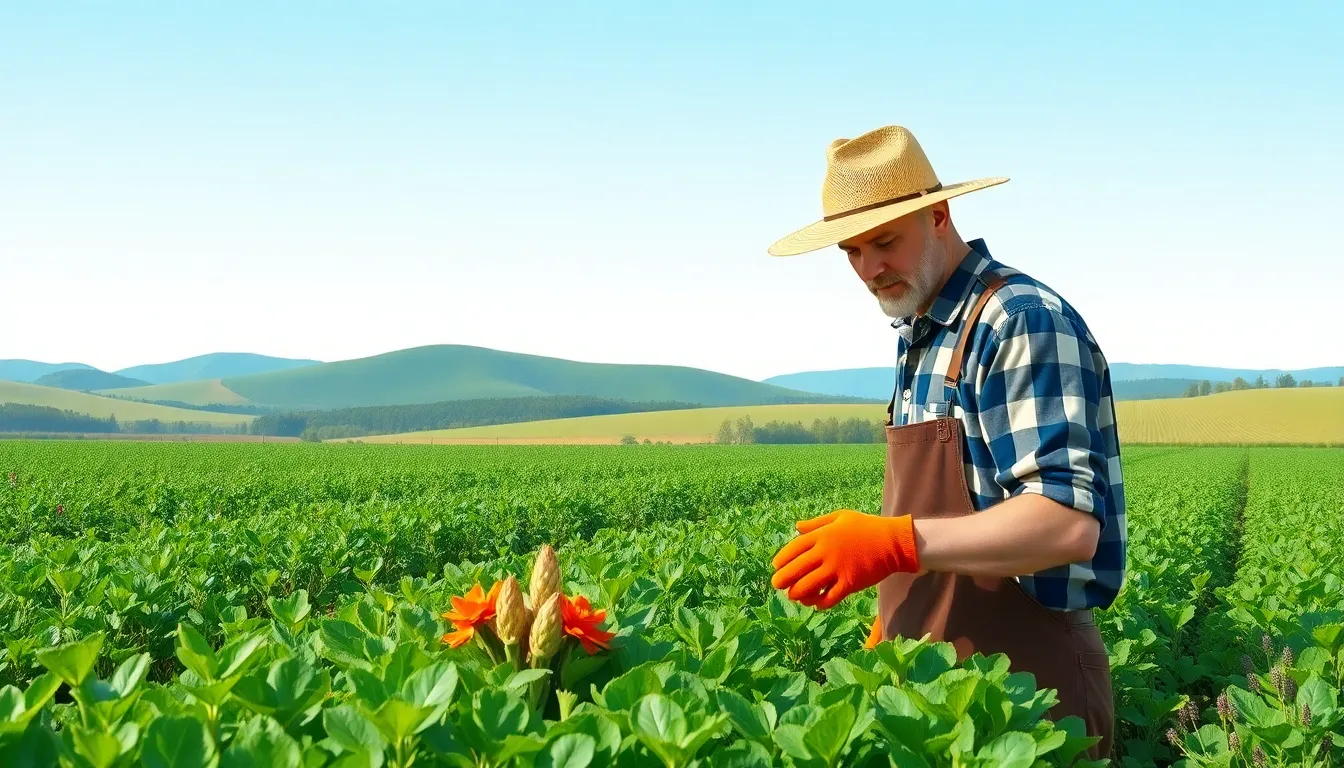In a world where food production often feels like a race against the clock, sustainable agriculture technology is the superhero we didn’t know we needed. Imagine a farming future where crops thrive without draining the planet’s resources, and farmers can predict the weather better than your local meteorologist. It’s not just a dream; it’s happening now, and it’s as exciting as finding a hidden stash of chocolate in your pantry.
From drones that monitor crop health to sensors that optimize water usage, these innovations are transforming the agricultural landscape. Farmers are swapping out their old tools for high-tech gadgets, making their operations more efficient and eco-friendly. So, buckle up as we dive into the fascinating world of sustainable agriculture technology—where saving the planet and growing delicious food go hand in hand, and every bite counts towards a greener future.
Table of Contents
ToggleOverview of Sustainable Agriculture Technology
Sustainable agriculture technology encompasses a range of innovative tools designed to promote environmentally friendly farming practices. Drones play a critical role in monitoring crop health by providing real-time aerial imagery, enabling accurate assessments of plant conditions. Sensors integrated into the soil can offer crucial data on moisture levels and nutrient content, allowing farmers to fine-tune irrigation and fertilization.
Precision agriculture techniques enhance resource utilization by minimizing waste and maximizing yield. Smart irrigation systems assess weather patterns and soil moisture to optimize watering schedules, conserving water efficiently. Automated machinery equipped with artificial intelligence can identify weeds, reducing the need for chemical herbicides and fostering a healthier ecosystem.
Vertical farming represents another exciting development, allowing crops to grow in stacked layers, using less land and water. This method, often implemented in urban areas, reduces the carbon footprint associated with transporting food by bringing production closer to consumers. Hydroponic and aquaponic systems further illustrate sustainable practices by using nutrient-rich water for plant growth, creating a symbiotic relationship with fish.
The Internet of Things (IoT) connects various agricultural devices, streamlining data collection and enhancing decision-making. Data analytics tools process information collected from devices, providing insights that drive efficient farming practices. By adopting these advanced technologies, farmers can increase productivity while protecting natural resources and supporting long-term agricultural resilience.
Sustainable agriculture technology represents a vital shift towards meeting the world’s food demands responsibly. Embracing these innovations positions the agricultural sector to thrive alongside environmental stewardship, ensuring a sustainable future for generations to come.
Importance of Sustainable Practices

Sustainable practices in agriculture play a crucial role in promoting environmental health and supporting economic growth. These practices help balance the need for food production with the necessity of conserving resources.
Environmental Benefits
Sustainable agriculture technology enhances soil health, conserves water, and reduces the use of harmful pesticides and fertilizers. Improved soil quality leads to better crop resilience against pests and diseases. Efficient water management minimizes waste, making farming more viable in dry regions. Utilizing renewable energy sources reduces reliance on fossil fuels, lowering greenhouse gas emissions. Enhanced biodiversity from sustainable practices supports ecosystem stability and resilience.
Economic Viability
Sustainable practices lead to reduced input costs through efficient resource usage. Innovations such as precision agriculture allow farmers to apply inputs only where needed, decreasing overall expenditure. Long-term profitability arises from healthier soils and reduced dependency on chemical inputs. Market demand for organic and sustainably grown products is rising, offering farmers access to premium prices. These adaptations not only increase income but also stabilize local economies, fostering community resilience in the face of climate change.
Innovative Technologies in Agriculture
Innovative technologies drive the future of agriculture, enhancing efficiency and sustainability. These advancements enable farmers to optimize production while minimizing environmental impact.
Precision Farming
Precision farming employs data analytics for improved decision-making in agriculture. Farmers utilize GPS technology and soil sensors to monitor field conditions accurately. This approach allows them to apply inputs such as water and fertilizers more efficiently, reducing waste. Increased crop yields result from targeted practices that adjust to specific field variations. Data-driven insights help manage resources smartly, promoting sustainable farming methods while enhancing profitability.
Vertical Farming
Vertical farming revolutionizes traditional agriculture by maximizing space in urban environments. Utilizing multiple layers for crop cultivation, growers can produce food year-round regardless of weather conditions. This method significantly reduces land use, allowing for food production in densely populated areas. Energy-efficient LED lighting and controlled climates enhance growth rates while minimizing water usage. Urban populations benefit from fresh produce, contributing to local food security and reducing transportation emissions.
Hydroponics and Aquaponics
Hydroponics and aquaponics stand as key technologies in sustainable agriculture. These systems grow plants in nutrient-rich water solutions without soil, conserving land resources. Hydroponics allows for high-density crop production, while aquaponics combines fish farming with plant cultivation, providing natural fertilization. Both methods use significantly less water than traditional farming practices. They contribute to sustainable practices by reducing carbon footprints and offering fresh produce closer to urban markets, enhancing accessibility for consumers.
Role of Data and Analytics
Data and analytics play a crucial role in enhancing sustainable agriculture practices. By leveraging advanced technologies, farmers can make informed decisions that significantly boost crop yields and resource efficiency.
Smart Sensors and IoT
Smart sensors collect real-time data on soil moisture, temperature, and nutrient levels. These sensors contribute to tailored irrigation schedules, reducing water wastage and improving crop health. IoT technology connects various agricultural devices, streamlining the communication of data among them. Automated systems can trigger actions based on sensor feedback, allowing farmers to respond swiftly to changing conditions. Increased visibility into field conditions drives proactive management, resulting in optimized farming operations.
Big Data in Farming Decisions
Big data analytics enables farmers to interpret vast amounts of information for strategic planning. Historical data trends provide insights that help in predicting weather impacts and pest outbreaks. Analyzing real-time data models allows for precise resource allocation, minimizing inputs like fertilizers and pesticides. Decision-making improves with the integration of satellite imaging and drone data, highlighting areas requiring attention. Overall, big data facilitates more resilient farming practices by equipping farmers with actionable insights tailored to their unique agricultural challenges.
Challenges and Limitations
Sustainable agriculture technology faces several challenges that can hinder its widespread adoption and effectiveness. Addressing these obstacles is essential for moving forward in the field.
Economic Barriers
Economic barriers significantly impact the implementation of sustainable agriculture technologies. High initial costs associated with purchasing advanced equipment, such as drones and precision irrigation systems, often discourage farmers from investing. Smaller farms especially struggle to afford such technologies, creating an uneven playing field. Limited access to credit or funding further compounds these issues, making it challenging for farmers to adopt innovative practices. Market fluctuations can also deter investment in sustainable technologies, with farmers prioritizing immediate returns over long-term benefits. As a result, economic constraints remain a major hurdle for the advancement of sustainable agricultural practices.
Adoption and Education
Adoption and education present additional challenges in the realm of sustainable agriculture. Many farmers lack the necessary training to effectively utilize new technologies, resulting in resistance to change. Familiarity with traditional methods often leads to hesitance in embracing innovations. Misunderstandings about the benefits of sustainable practices can further impede progress. Providing targeted education and resources greatly aids in overcoming these barriers. Workshops, online courses, and farmer-to-farmer mentorship programs can enhance knowledge and skills. Ultimately, increasing awareness and understanding of sustainable agriculture technology is crucial for widespread adoption.
Sustainable agriculture technology represents a pivotal shift in how food is produced and consumed. By embracing innovative solutions like precision farming and smart irrigation, farmers can significantly enhance efficiency while safeguarding the environment. The integration of data and analytics not only streamlines operations but also empowers farmers to make informed decisions that promote resilience.
As challenges persist in adopting these technologies, ongoing education and support will be crucial. The future of agriculture hinges on the ability to adapt and innovate, ensuring food security and environmental health for generations to come. By prioritizing sustainable practices, the agricultural sector can thrive economically while contributing to a greener planet.
